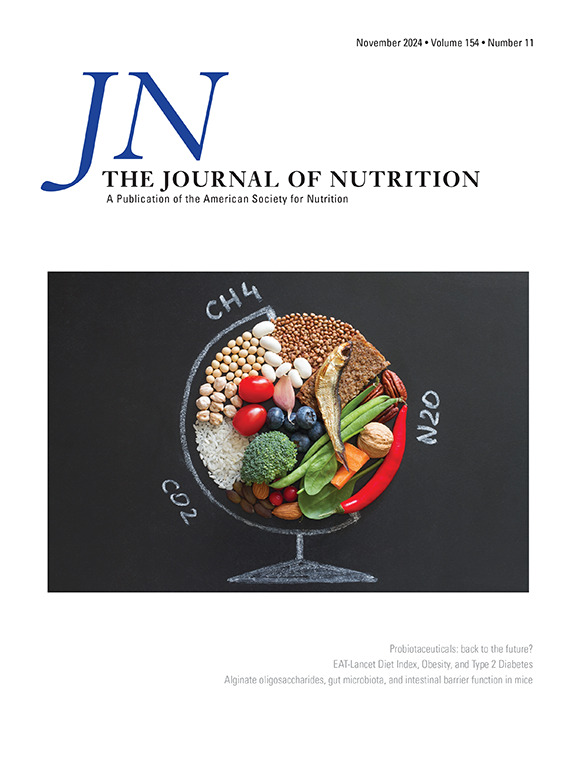Effects of Vitamin D-3 Supplementation During Pregnancy and Lactation on Maternal and Infant Biomarkers of Environmental Enteric Dysfunction, Systemic Inflammation, and Growth: A Secondary Analysis of a Randomized Controlled Trial
IF 3.8
3区 医学
Q2 NUTRITION & DIETETICS
引用次数: 0
Abstract
Background
Environmental enteric dysfunction (EED) is an acquired, subclinical state of intestinal inflammation common in children and adults in low-income and middle-income countries. Although vitamin D-3 supplementation has purported anti-inflammatory properties, its ability to ameliorate biomarkers of EED remains unclear.
Objectives
This study aimed to examine the effects of maternal vitamin D-3 supplementation during pregnancy and lactation on biomarkers of EED, systemic inflammation, and growth in women living with HIV and their infants in Dar es Salaam, Tanzania.
Methods
We conducted subgroup analyses among randomly selected mothers (n = 720) and infants (n = 365 at 6 wk of age, and n = 266 at 6 mo of age) who participated in a randomized, triple-blind, placebo-controlled trial of daily maternal 3000 IU vitamin D-3 supplementation from the second trimester of pregnancy until 1 y postpartum. Biomarkers of EED (soluble CD14 and intestinal fatty acid-binding protein), systemic inflammation (C-reactive protein and α1-acid glycoprotein), and growth factors (insulin-like growth factor 1 and fibroblast growth factor 21) were measured via the Micronutrient and Environmental Enteric Dysfunction Assessment Tool. Anti-flagellin and anti-lipopolysaccharide immunoglobulins were measured via enzyme-linked immunosorbent assay. Comparisons by randomized treatment arm were performed using ordinary least squares regression models with log2-transformed biomarkers.
Results
At 32 wk of gestation, intestinal fatty acid-binding protein (β: −0.19; P = 0.03) and α1-acid glycoprotein (β:−0.11; P = 0.04) were significantly lower in mothers in the vitamin D-3 group than those in mothers in the placebo group. At 6 wk of age, insulin-like growth factor 1 (β:−0.31; P = 0.03) was significantly lower in infants whose mothers were in the vitamin D-3 group than that in infants whose mothers were in the placebo group.
Conclusions
Vitamin D-3 supplementation during pregnancy and lactation reduced selected EED and systemic inflammation biomarkers among women living with HIV. While the effects of maternal vitamin D-3 supplementation do not appear to extend to infants, there may be an effect on growth factors.
This trial was registered at clinicaltrials.gov as NCT02305927 (https://clinicaltrials.gov/study/NCT02305927).
孕期和哺乳期补充维生素 D3 对母婴环境肠道功能紊乱、全身炎症和生长的生物标志物的影响:一项随机对照试验的二次分析。
背景:环境性肠道功能紊乱(EED)是一种获得性亚临床肠道炎症状态,常见于中低收入国家的儿童和成人。尽管维生素 D3 补充剂据称具有抗炎特性,但其改善 EED 生物标志物的能力仍不明确:研究坦桑尼亚达累斯萨拉姆地区感染艾滋病毒的妇女及其婴儿在孕期和哺乳期补充维生素 D3 对 EED 生物标志物、全身炎症和生长的影响:我们对随机抽取的母亲(720 人)和婴儿(365 人,6 周大时;266 人,6 个月大)进行了亚组分析,这些母亲和婴儿参加了一项随机、三重盲、安慰剂对照试验,即从怀孕后三个月到产后一年,母亲每天补充 3000 IU 维生素 D3。通过微量营养素和环境肠道功能障碍评估工具测量了肠道功能障碍的生物标志物[可溶性CD14和肠道脂肪酸结合蛋白(I-FABP)]、全身炎症[C反应蛋白和α-1-酸性糖蛋白(AGP)]和生长因子[胰岛素样生长因子-1(IGF-1)和成纤维细胞生长因子21]。抗鞭毛虫素和抗多糖免疫球蛋白通过酶联免疫吸附试验进行测定。使用普通最小二乘法回归模型对随机治疗组的生物标记物进行比较:妊娠32周时,维生素D3组母亲的I-FABP(β:-0.19,p = 0.03)和AGP(β:-0.11,p = 0.04)显著低于安慰剂组。在婴儿六周大时,维生素 D3 组与安慰剂组相比,IGF-1(β:-0.31,p = 0.03)明显降低:结论:在妊娠期和哺乳期补充维生素 D3 可降低感染艾滋病毒妇女的特定 EED 和全身炎症生物标志物。虽然母体补充维生素 D3 的效果似乎不会延伸到婴儿身上,但可能会对生长因子产生影响:临床试验登记:ClinicalTrials.gov 母体试验标识符:NCT02305927 (https://clinicaltrials.gov/study/NCT02305927)。
本文章由计算机程序翻译,如有差异,请以英文原文为准。
求助全文
约1分钟内获得全文
求助全文
来源期刊

Journal of Nutrition
医学-营养学
CiteScore
7.60
自引率
4.80%
发文量
260
审稿时长
39 days
期刊介绍:
The Journal of Nutrition (JN/J Nutr) publishes peer-reviewed original research papers covering all aspects of experimental nutrition in humans and other animal species; special articles such as reviews and biographies of prominent nutrition scientists; and issues, opinions, and commentaries on controversial issues in nutrition. Supplements are frequently published to provide extended discussion of topics of special interest.
 求助内容:
求助内容: 应助结果提醒方式:
应助结果提醒方式:


